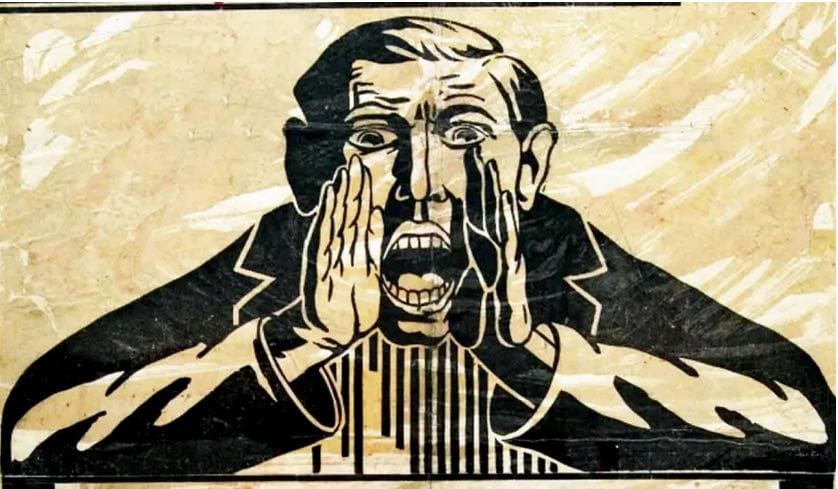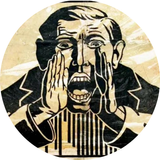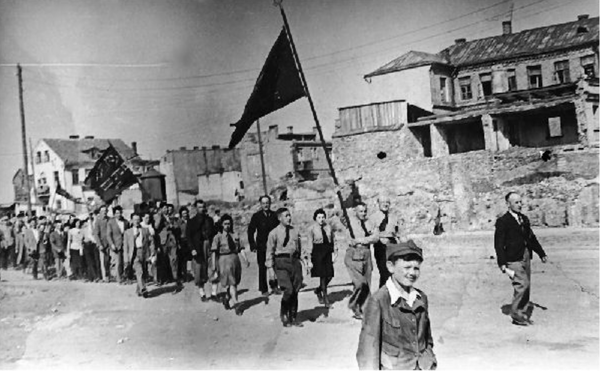Welcome to Der Spekter!

Welcome to Der Spekter, a new platform hosting resurgent worldwide Jewish, socialist, and anti-nationalist ideas!
The current crisis in Israel and Palestine has highlighted already-growing generational and ideological divides within Jewish communities worldwide. Suddenly, the principles of Bundism, an anti-nationalist, socialist answer to burgeoning antisemitism and the increasingly militant Zionist movement, have become urgently relevant. The great majority of today’s Jews have grown up in a world whose Jewish institutions centered allegiance to the Israeli State and erased the cultural creations of centuries of diasporic Jewish life. It is a small wonder that so many Jews, repulsed and angered by the Israeli slaughtering of Palestinians on the altar of “safeguarding the Jews by safeguarding the Jewish state,” see in Bundist ideas an attractive alternative to the pro-Israel-no-matter-what Jewish world they grew up in.
The Bundist movement was founded in pre-revolutionary Russia in 1897—the same year the first Zionist Congress was convened by Theodor Herzl—as a secular, socialist response to rising antisemitism and nationalism. It grew in strength and significance in inter-war Poland, where it created a flourishing political, social, and countercultural life for its tens of thousands of members, only to be murdered by the Nazi genocide (the great majority of Polish Bundists were working class, without means to escape the Holocaust) and Soviet repression (the two leaders of the Polish Bund were murdered by Stalin’s regime). Its three central principles of international socialism, Jewishness, and ‘hereness’ (in Yiddish, doikayt—fighting for equality and dignity wherever we live) have survived the decimation of its pre-Holocaust membership.
Throughout this storied history, and even before the Jewish Labor Bund was officially founded, Jewish socialists had discussed the importance of reaching the Jewish masses to spread the message of socialism and solidarity. By December of 1896, Der Yidisher Arbeter (“The Jewish Worker”) was established in Vilna for this purpose; by its sixth issue in March of 1899, it became an official newspaper of the General Jewish Labor Bund. It was published in Yiddish, the language of the workers, not in Russian, German, or French, the languages of the European elites. Despite repeated targeting of Bundist organs and presses in the last decades of Tsar Nicholas II and his secret police, these Jewish leftists pushed on, knowing that spreading the message of Bundism was worth the risk.
Most importantly, Bundist perspectives were delivered unfiltered directly to the oppressed Jews of Europe without reinterpretation or mediation by capitalist presses. Only those who can speak freely can hope to organize effectively. To depend on unsympathetic corporations and governments to spread a message is to doom it to irrelevance.
Today, we see the same phenomenon in the coverage of what some have taken to call “neo-Bundism,” which has been dismissed, reduced to a curio, declared quaint in opposition to the tides of injustice. This is neither new nor unexpected. During the post-Holocaust ideological struggle between a Bundism that had been decimated by Nazism and an ascendant Zionism, the Bund became “‘unwritten’ from history, and either silenced or ignored and therefore retrospectively marginalized,” writes Frank Wolff.
Contemporary Bundist perspectives deserve an independent, Bundist platform. Enter Der Spekter, a new online forum to inform, debate, report on, and inspire a 21st-century Bundist resurgence. We draw inspiration from the long and storied history of Bundist publishing that came before us, from Jewish Socialist dailies like Folkszeitung to periodicals like Untser Tsait and The Jewish Labor Bund Bulletin, for a bright and prosperous Bundist future.
Der Spekter was created to serve as a platform for new Bundist perspectives, original artwork, journalism, and more. Although our editors are members of the International Jewish Labor Bund (IJLB), this publication is editorially independent of the organization, and our editorial board members do not hold leadership positions in the IJLB. All materials published in these pages reflect the views of the author[s] and are not official communiques of the IJLB or of its local chapters unless explicitly stated.
“Spekter” in Yiddish has two meanings:
- “Specter” (or, in other words, “ghost” or “apparition”)
- “Spectrum” (or, in other words, “gamut” or “wide array”)
Der Spekter is animated by the same spirit of Bundism that has haunted Zionism since their twin inceptions: we cannot ensure peace through the application of unjust violence. The only path forward is true solidarity with the oppressed, not becoming oppressors.
Pitch Der Spekter!
Der Spekter is looking for pitches that encompass two out of the three pillars of Bundism: socialism, Jewishness, and doikayt. We welcome submissions of essays, opinion pieces, investigative journalism, original artwork, media reviews, cultural criticism, music, and more.
We want pieces that are rooted in Bundist tradition but also say something about our contemporary world and where we’re headed in the future. Think Daniel Kahn, Yasha Levine’s Weaponized Immigrant series, and Shaul Magid’s new book on Zionism and exile. You do not have to be a member of the Bund to pitch to Der Spekter.
We are particularly interested in contributions on the following topics:
- Event coverage of the Yidstock music festival, and what it means in 2024 in the wake of Israel’s war on Gaza and the resurgence of Bundism
- What it means to be an Israeli Bundist today
- The intersection of Bundism and disability/queerness/race/class/gender
- Jewishness within today’s resurgent labor movement
Unfortunately, as a grassroots, all-volunteer publication, we are unable to provide compensation for contributions at this time, but we hope to have the means to do so in the future.
To be considered for publication, please send us a brief pitch by email at spekter@derbund.org. Give us an idea of your story/artwork in a few paragraphs and make sure to include a word count, proposed deadline, writing/reporting plan, format (for artwork or music), and a brief introduction about yourself. Editors will try to reply to all pitches within a week.
At this critical juncture, we believe that a united front against nationalism and antisemitism can be achieved through organizing and international solidarity. We hope you’ll join us.


